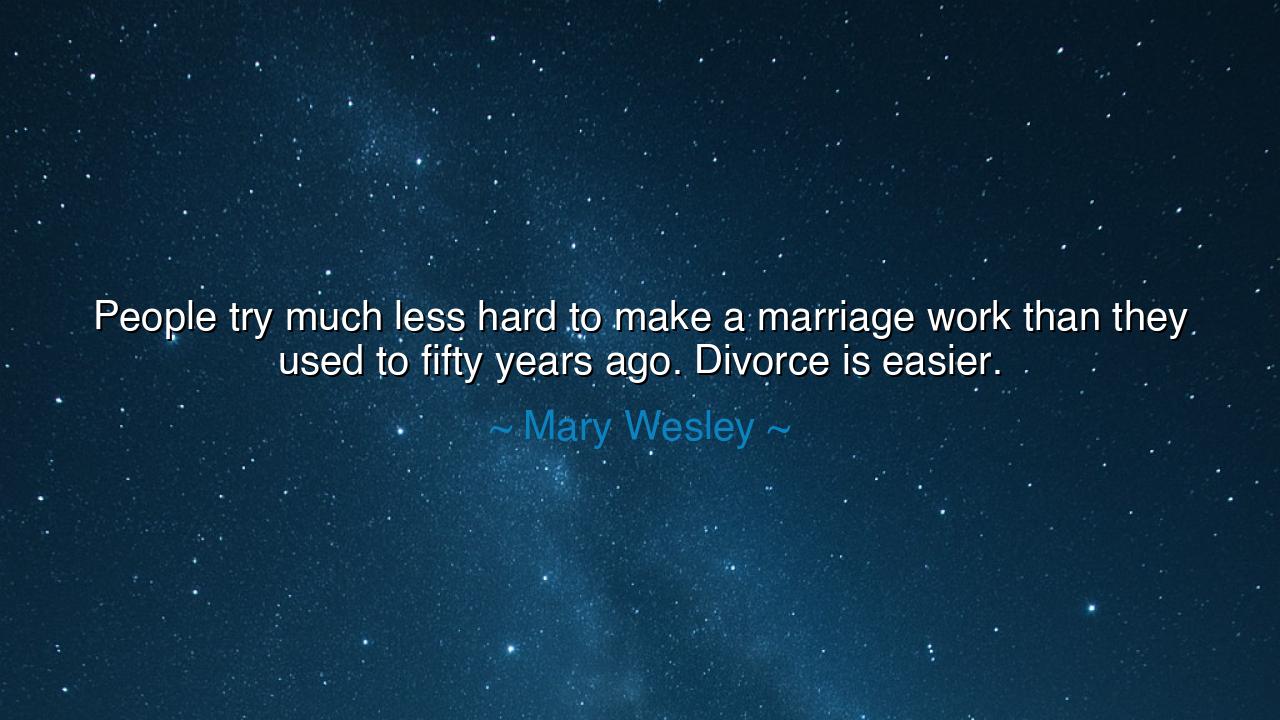
People try much less hard to make a marriage work than they used
People try much less hard to make a marriage work than they used to fifty years ago. Divorce is easier.






In the ever-evolving landscape of human relationships, few bonds have been as sacred, as challenging, or as enduring as marriage. The words of Mary Wesley—"People try much less hard to make a marriage work than they used to fifty years ago. Divorce is easier"—speak to a profound shift in society’s understanding of commitment, duty, and sacrifice. Once considered an unbreakable bond, marriage today seems less tethered to the idea of forever and more to the individual desires and circumstances of the present moment. This shift invites us to reflect not just on the institution of marriage itself, but on the very nature of commitment and what it means to invest in something greater than oneself.
In the ancient world, marriage was seen as the bedrock of both personal and societal stability. The great philosopher Aristotle argued that the family is the core of the polis, the city-state, and that a well-ordered household would lead to a well-ordered society. In his view, marriage was not merely about personal happiness but about the common good, the shared responsibility between husband and wife to sustain their family, raise their children, and contribute to the greater society. The bond of marriage was meant to be enduring, where both partners worked together through life’s inevitable challenges, committed to mutual growth and the well-being of their children and community. Divorce, in such a world, was not a readily available option—it was the last recourse, reserved for extreme circumstances.
Consider, too, the example of Hera and Zeus, the king and queen of the gods in Greek mythology. Their marriage, though fraught with trials and challenges—many of them caused by Zeus’ infidelities—was marked by a deep, if tumultuous, commitment. Hera, as the goddess of marriage, fiercely defended the sanctity of their union, even as she endured his betrayals. Her commitment to Zeus, despite his flaws and their struggles, reflected the ancient ideal that marriage was a bond that transcended personal failings, one that demanded endurance, patience, and sacrifice. This myth underscores the ancient belief that marriage was not about fleeting emotions but about a lasting, sacred commitment to a shared life.
However, as Mary Wesley suggests, in the modern world, the institution of marriage has changed. Divorce, once a difficult and socially frowned-upon decision, is now far more accessible. The ease with which couples can part ways reflects a shift in societal values. No longer is marriage seen primarily as a lifelong commitment but more as a partnership that can be dissolved when personal desires, happiness, or convenience no longer align. While this has brought freedom to many who were trapped in unhappy or abusive relationships, it has also, in many ways, diminished the sacrifice and endurance that once defined the sacredness of marriage. The idea of working through difficult times, of holding on even when the road is rough, has become less prominent in a world that places such emphasis on individual fulfillment.
Consider the story of Elizabeth Barrett Browning and Robert Browning, whose marriage was forged through intellectual and emotional connection, but also through great sacrifice. Elizabeth’s health was frail, and their early years together were filled with hardship. Yet, their relationship endured, and both poets supported one another through life’s trials. Their marriage, though not without its challenges, was an embodiment of the belief that true love and partnership require both the strength to endure and the willingness to invest in something beyond oneself. Their story is a testament to the idea that marriage can be a powerful force for growth and endurance, one that calls for effort and commitment, not just in the good times, but especially in the bad.
Wesley’s statement offers us a sobering reflection on the state of marriage in today’s world. It calls us to reflect on the nature of commitment—not just in marriage, but in all relationships. The idea that people are willing to invest less in making marriage work today than they did in the past challenges us to reconsider what commitment truly means. Is it simply about personal happiness, or is it about something deeper—a shared journey in which both partners are willing to sacrifice for the sake of something greater than themselves? True commitment, whether in marriage or any other meaningful relationship, requires an understanding that not all roads are smooth, but that love and partnership are worth fighting for.
The lesson from Wesley’s words is one of reflection and dedication. It calls us to examine our own relationships and ask: Are we willing to put in the effort required to make them work? Are we ready to endure through the difficult times, to give of ourselves even when it feels hard? Like the ancient philosophers and the couples of old, we must remember that true love is not built on convenience or fleeting emotion, but on the willingness to invest, to grow, and to support one another through life’s challenges. In a world that too often values immediacy and personal fulfillment, we must remember that the greatest relationships—those that stand the test of time—are built on sacrifice, effort, and the understanding that love, in its deepest form, is an ongoing choice.
In your own life, consider the commitment you bring to your relationships. Whether in marriage, friendship, or family, are you willing to endure, to sacrifice, and to work toward the greater good of the partnership? Just as Wesley reflects on the changing tides of marriage, we must ask ourselves how we can honor the commitments we make. For true love is not a fleeting spark—it is a steady flame, one that requires tending, patience, and, above all, sacrifice.






AAdministratorAdministrator
Welcome, honored guests. Please leave a comment, we will respond soon